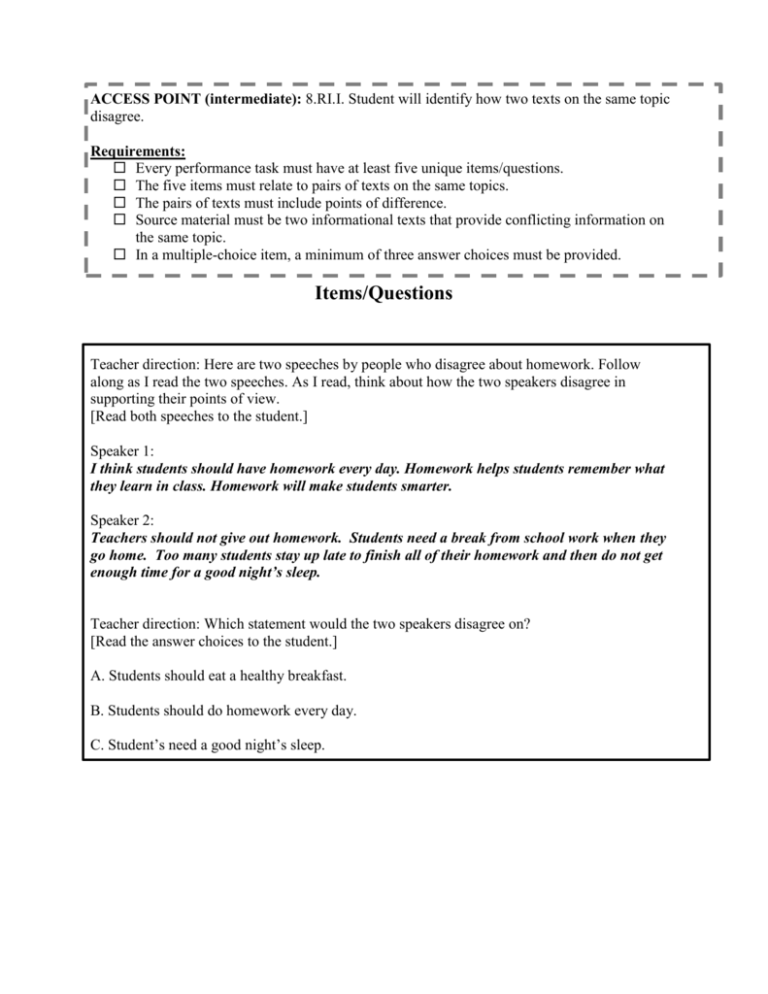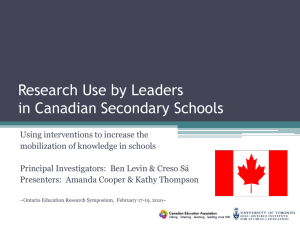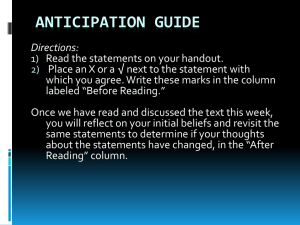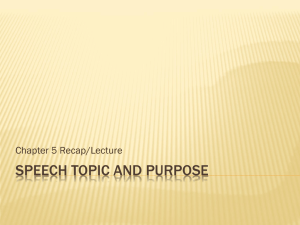Intermediate
advertisement

ACCESS POINT (intermediate): 8.RI.I. Student will identify how two texts on the same topic disagree. Requirements: Every performance task must have at least five unique items/questions. The five items must relate to pairs of texts on the same topics. The pairs of texts must include points of difference. Source material must be two informational texts that provide conflicting information on the same topic. In a multiple-choice item, a minimum of three answer choices must be provided. Items/Questions Teacher direction: Here are two speeches by people who disagree about homework. Follow along as I read the two speeches. As I read, think about how the two speakers disagree in supporting their points of view. [Read both speeches to the student.] Speaker 1: I think students should have homework every day. Homework helps students remember what they learn in class. Homework will make students smarter. Speaker 2: Teachers should not give out homework. Students need a break from school work when they go home. Too many students stay up late to finish all of their homework and then do not get enough time for a good night’s sleep. Teacher direction: Which statement would the two speakers disagree on? [Read the answer choices to the student.] A. Students should eat a healthy breakfast. B. Students should do homework every day. C. Student’s need a good night’s sleep. Teacher direction: Here are two speeches by people who disagree about chewing gum in school. Follow along as I read the two speeches. As I read, think about how the two speakers disagree in supporting their points of view. [Read both speeches to the student.] Speaker 1: All students should be allowed to chew gum in school. Scientists have discovered that chewing gum can help learning. The scientists learned that students who chewed gum could concentrate longer. Students even earned better grades. Speaker 2: Even though scientists say chewing gum can help learning, I do not think students should be allowed to chew gum in school. Students spit the gum out on the floor and squish the gum under the tables. This makes a mess for other students and the janitor. Also some people chew too loud or pop bubbles making it difficult for those around them to concentrate on their own work. Teacher direction: Which statement would the two speakers disagree on? [Read the answer choices to the student.] A. Students should be allowed to chew gum in school. B. Gum comes in many different flavors. C. Scientists say that chewing gum can help learning. Teacher direction: Here are two speeches by people who disagree about wearing hats in school. Follow along as I read the two speeches. As I read, think about how the two speakers disagree in supporting their points of view. [Read both speeches to the student.] Speaker 1: Students should not wear hats in school. Students wear hats to avoid eye contact with teachers. Students use the hats to hide that they are sleeping. Some students will do bad things in the hallways and their hats keep the security cameras from seeing who did it. Speaker 2: I think students should be allowed to wear hats in school. Some students feel more comfortable when wearing hats. Students also like to wear hats to support their sports teams. It is also nice to be able to wear a hat on a bad hair day. Teacher direction: Which statement would the two speakers disagree on? [Read the answer choices to the student.] A. Hats are expensive. B. Students should be able to wear hats. C. Hats come in many sizes. Teacher direction: Here are two speeches by people who disagree about students having cell phones at school. Follow along as I read the two speeches. As I read, think about how the two speakers disagree in supporting their points of view. [Read both speeches to the student.] Speaker 1: Students should be allowed to use cell phones in school. Most cell phones are mini computers. Students can use these to look up information for school assignments. Students can also use the phones to have anonymous class discussions with the teacher. Speaker 2: Students should not have cell phones in school. Cell phones are distracting. Students should be doing their assignments and not texting their friends. Students can use cell phones to pass answers to each other or look up answers on the internet. Teacher direction: Which statement would the two speakers disagree on? [Read the answer choices to the student.] A. There are many different types of cell phones. B. Students should be doing their class assignments. C. Students should be allowed to have cell phones in school.









